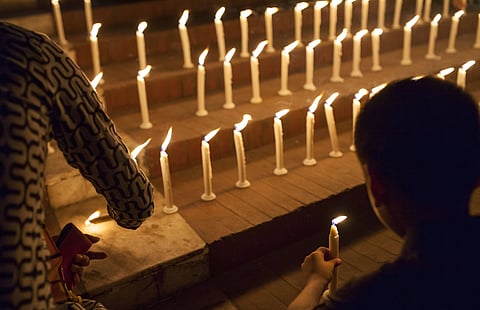Saima Begum on Bangladesh’s birangona women: Southasia Review of Books podcast #32
Welcome to the Southasia Review of Books podcast, where we speak to celebrated authors and emerging literary voices from across Southasia. In this episode, Shwetha Srikanthan speaks to the British-Bangladeshi writer Saima Begum about her debut novel The First Jasmines (Hajar Press, July 2025).
In 1971, during the nine-month war that gave Bangladesh its independence from then West Pakistan, the Pakistan Army carried out a brutal crackdown against Bengalis in which hundreds of thousands of women were detained and repeatedly brutalised.
What the women had experienced was one of the first recorded examples of rape being used as a weapon of war in the 20th century. However, an uncanny silence has remained when it comes to the birangonas’ own testimonies.
Within Bangladesh, widespread stigma led to the women being ostracised by their communities, and their accounts are suppressed by silencing and shame. Today, a plaque at the Liberation War Museum in Dhaka reads: “There are not many records of this hidden suffering.” Yet across the country, there are survivors with stories to tell.
Set against the final weeks of the Liberation War in Bangladesh, Saima Begum’s novel follows two sisters, Lucky and Jamila, who are captured and imprisoned by the Pakistan military.
Through their story, Begum writes the birangona women back into a history from which they had been largely erased. The First Jasmines brings to light the experiences of the women who endured unimaginable violence and injustices in 1971 and its invisible aftermath – women whose voices have largely been excluded from national memory and popular narratives.
This episode is now available on Youtube, Spotify and Apple Podcasts
Episode notes:
The First Jasmines by Saima Begum (Hajar Press, July 2025)
The Spectral Wound: Sexual Violence, Public Memories and the Bangladesh War of 1971 by Nayanika Mookherjee (Duke / Zubaan, October 2015)
War Heroines Speak: The Rape of Bangladeshi women in 1971 War of Independence by Nilima Ibrahim, translated by Nusrat Rabbee (February 2021)
Rising from the Ashes: Women’s Narratives of 1971 edited by Shaheen Akhtar (November 2013)
Rising Silence (2018) documentary film by Leesa Gazi
Women, War and the Making of Bangladesh: Remembering 1971 by Yasmin Saikia (Duke University Press, 2011)
Birangona: towards ethical testimonies of sexual violence during conflict by Nayanika Mookherjee and Najmun Nahar Keya (Durham University, 2019)
History and the birangona: The ethics of representing narratives of sexual violence of the 1971 Bangladesh war - Nayanika Mookherjee (Himal Southasian, November 2015)
The Birangana and the birth of Bangladesh: Women and wombs during, and following, the Liberation War - Laxmi Murthy (Himal Southasian, March 2012)
Victory’s silence: Why war babies in Bangladesh experience significant stigma and prejudice - Bina D’costa (Himal Southasian, December 2008)
Scattered memories of 1971: Forgetting and remembering the birth of Bangladesh at Dhaka’s Muktijuddho Jadughor - Antara Datta (Himal Southasian, February 2008)
A Bangladeshi feminist’s personal – and political – history of her land - Sarah Anjum Bari (Himal Southasian, August 2024)
Samina Luthfa on the battles of women in a new Bangladesh: State of Southasia #27 (Himal Southasian, July 2025)
✨Thank you for listening to the Southasia Review of Books Podcast from Himal Southasian. If you like this episode, please share widely, rate, review, subscribe and download the show on your favourite podcast apps.
✉️Let’s keep the conversation going – please share your thoughts on the episode. Leave us a comment on Youtube or write to us at editorial@himalmag.com.
🎙️Tune in to Himal’s State of Southasia podcast hosted by associate editor Nayantara Narayanan, featuring conversations on pressing social and political issues from across Southasia.
📼The Himal Southasian YouTube channel now has 2000+ subscribers! If you haven’t already, do subscribe and help us spread the word by sharing these episodes widely.
🙏🏼If you’d like to support our work, please do become paying Himal Patron – we have a great programme with lots of perks, and we’ll welcome you to a fantastic Southasia Review of Books community.

